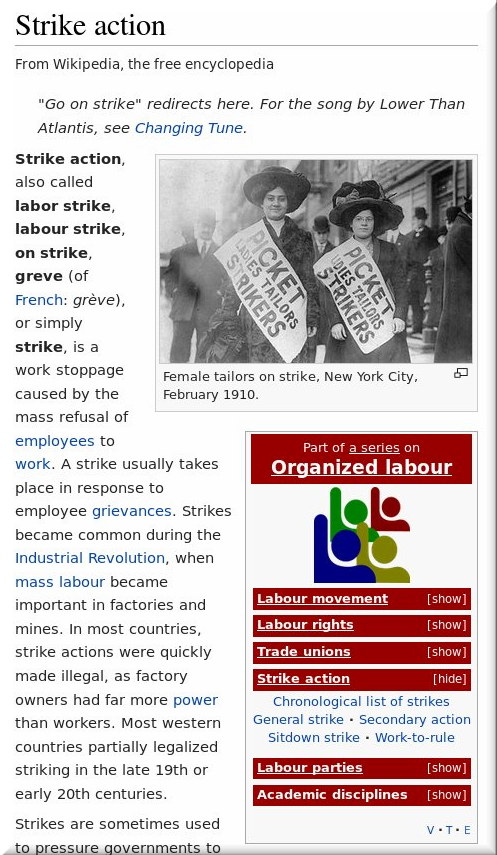

OVER the past few days we've written twice about EPO strike ballot. There's going to be a ballot for a strike (such initiatives used to get 90% of people in favour, if not more, probably due to some in management voting against). Rules have been made stricter to make it harder to initiate strikes (thresholds, delays, intimidation, miscommunication, blackout, misinformation, and various other voter suppression tactics). Over the years we wrote dozens of articles about past strikes as well as actions to restrict these. Among them:
‘Almost one year after the arrival as Mr. Campinos as President of the EPO, we note with regret that the social situation hasn’t improved and that none of the root causes of the many issues that trouble our organisation have been addressed. The Battistelli administration and its anti-staff policies are still in place. The situation in the office is more toxic than ever, as also shown by the recent disastrous staff survey results and the worsening of staff health. There are many reasons for discontent’, the SUEPO wrote to president Campinos last week.
[...]
The EPO staff survey mentioned earlier (and reported about on this blog) showed four in ten staff members say they face substantial obstacles to doing their job well. They have a very negative view of management effectiveness, with low confidence in senior management decisions. Only 39 percent feel they are treated with respect.
In the meantime, the president of the Federation of International Civil Servants’ Associations (FICSA), which represents the interests of more than 20.000 staff in the international civil service, wrote to Campinos yesterday as well, expressing ‘grave concern about the apparent lack of meaningful progress in the social dialogue at the EPO as reported to FICSA.’
Under EPO regulations, organising a strike can take more than a month. The SUEPO wants the strike to take place around the next meeting of the Administrative Council on 26 and 27 June 2019. The strike action is subject to a staff ballot, which has to be organised by the administration before 16 June.
Mr. Campinos sets a new record with his arrogant style, dilettante fashion and worrying lack of genuine work and concrete action. Less than a year after he took office, he who was presented as the king of social dialogue, you bet he is indeed!
All this is also the sad result of the work of his preferred advisers’, the duo Bergot-Requena.
Surely the famous “french touch” found on http://www.suepo.org : https://www.challenges.fr/entreprise/vie-de-bureau/burn-out-alerte-rouge-sur-le-management-a-la-francaise_655248
All this is utterly depressing. This unsolved social crisis obviously impacts on the functioning of the EPO to the detriment of the users and the public. The quality of the work delivered is plummeting since management by fear and pressure coupled to wrong incentives creates a deleterious work environment.
Also illustrative of the unhealthy practices at the EPO under the current administration :
during the recent Budget and Finance Committee in Munich Mr Campinos is said to have tried and fortunately blatantly failed, to obtain no less than 600 (!) Mio EUR ( some delegations actually reported of 1 billion EUR, a “mere” 400 Mio difference but hey : so what? ) for “imperative” building works office-wide which no one, except Campinos and the duo Requena-Bergot probably, consider imperative.
Fortunately for once the delegations were awake: indeed 16 voted to modify the agenda point from “for vote” to “for information”, further 19 abstained. 35 out of 39 delegations thus refused to follow Campinos blindly. This is no surprise since Campinos took them for nothing but fools (they were provided with a very thin rationale to support the need for such an enormous amount of applicants’ money, they had only a few weeks to make up their minds and no time to ask questions).
To paraphrase his own words, from his recent distasteful communiqué on EPO’s intranet :
– Would Mr Campinos not be a little “excessive” on this one ? – Is that how Mr Campinos concretely acts when it comes to handle “taxpayers’ money” with “due diligence, due process and careful legal assessment” ?
As Americans put it : follow the money.
CUI BONO?
One reads this post and cannot believe that this is what the EPO has become.
In less than a decade, a bunch of managers have succeeded in annihilating one of the few (the only?) European organizations governed by engineers and scientists who actually knew what they were doing.
the letter of FICSA to Mr Campinos mentioned in the Kluwer article can be found here : http://techrights.org/2019/05/24/ficsa-last-chance/
[...]
And before FICSA, Union Syndicale Federale (USF) wrote to Mr Campinos https://www.unionsyndicale.eu/wp-content/uploads/2019/04/USF_OEB_2019-04-29-12-48-18.pdf
The manner in which the EPO’s future financial status has been reported worrys [sic] me greatly.
It is self-evidently not the case that the EPO is in any danger of going in to the red. If it were, then would it really have decided to massively increase the risk level with regard to the investments that it makes with a substantial portion of its enormous cash reserves? After all, if you cannot afford to lose, then you do not take unnecessary risks!
So, given that the projected deficit is nothing more than a fantasy, one has to ask why on earth would the EPO’s management want to try to sell that fantasy? Whilst I do not know the real reason for this, it is clear that it cannot be anything good … hence my concern about what on earth the EPO’s management could be planning.